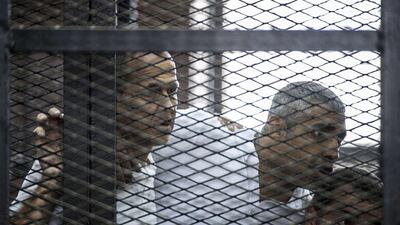CAIRO // Three Al Jazeera journalists accused of supporting the Muslim Brotherhood in Egypt were jailed for seven years on terrorism-related charges on Monday.
The verdicts against Canadian-Egyptian Mohamed Fahmy, Australian Peter Greste and Egyptian Baher Mohammed stunned their families and drew international criticism.
The three, who were arrested in December, said they were prosecuted for doing their jobs as journalists, covering Islamist protests against the popular removal last year of President Mohammed Morsi.
The trial took place amid increased tensions between the Egyptian government and the Qatar-based Al Jazeera network, which authorities accuse of bias towards the Muslim Brotherhood and Morsi.
The men were charged with supporting the Muslim Brotherhood, which was declared a terrorist group in December, and with fabricating footage to damage Egypt’s security. Three other foreign journalists — two Britons who worked for Al Jazeera and a Dutch freelance reporter who had no connection to Al Jazeera but once met Fahmy for tea in his makeshift office at a luxury hotel in Cairo — were sentenced to 10 years in absentia.
The verdicts came a day after US Secretary of State John Kerry discussed the case in cairo with the newly elected President Abdel-Fattah El Sisi, the former army chief who ousted Morsi.
“Today’s conviction is obviously a chilling and draconian sentence,” Mr Kerry said in Baghdad yesterday. He phoned Egypt’s Foreign Minister Sameh Shukri to register Washington’s “serious displeasure”
The sentences shocked the defendants and their families and supporters inside the Cairo courtroom.
“They will pay for this, I promise,” shouted Fahmy, who was Al Jazeera English’s acting Cairo bureau chief. Guards pulled him from the defendants’ cage, dragging him by the arms — despite a shoulder injury.
Greste, an award-winning correspondent, silently raised a clinched fist in the air.
Fahmy’s mother and fiance broke down in tears. “Did anybody see any evidence against him?” his mother, Wafaa Bassiouni said. “Who did he kill?”
Greste’s brother Andrew said he was “gutted” and said there would be an appeal. “We have seen no incriminating evidence,” he said.
The three will be jailed in a maximum-security prison. Mohammed, the team’s producer, received an extra three years for possessing ammunition — a reference to a spent shell he had picked up from protests as a souvenir.
There were 17 co-defendants in the case — seven journalists and the rest students accused of giving footage to the journalists. Four were sentenced to seven years each, two were acquitted, and the rest — tried in absentia — received 10-year sentences.
“We are shocked, utterly shocked by this verdict,” said Julia Bishop, the Australian foreign minister. “This verdict is hardly sending the message to the international community that Egypt is fulfilling transition to democracy.”
She said Australia would contact Mr El Sisi and ask him to intervene.
Egypt’s Foreign Ministry said its ambassadors abroad would explain the verdicts and stress Egypt’s “full rejection” of interference in its internal affairs or the independence of its judiciary.
If they appeal, the three journalists would remain in prison unless they win a separate “suspension of verdict” ruling. An appeal could grant them a retrial, but only if flaws in the court proceedings are found.
The managing director of Al-Jazeera English, Al Anstey, said Egyptian authorities should be “held to account by the global community”.
“To have detained them for 177 days is an outrage. To have sentenced them defies logic, sense, and any semblance of justice,” he said.
In August, a journalist for Al-Jazeera’s Arabic channel, Abdullah Elshamy, was arrested while covering protests. He was held without charge and went on hunger strike for more than four months until he was released last week.
Egypt’s courts have already come under heavy international criticism over trials connected to the anti-Islamist crackdown. Courts have sentenced to death hundreds after cursory mass trials on charges of involvement in deadly violence.
Greste, Fahmy and Mohammed were arrested when police raided the Cairo hotel room they were using as an office. Police confiscated their equipment, computers and other items.
During the trial, prosecutors said they would present fabricated footage aired by the defendants as evidence they aimed to undermine Egypt’s security.
Instead, they presented some footage showing clashes between pro-Morsi protesters and police, but without any indication it was falsified. They also cited as evidence leaflets that the three had picked up at the protests. Mostly, they presented random video clips also found on the three that had nothing to do with the case — including a report on a veterinary hospital in Cairo, another on Christian life in Egypt and old footage of Greste from previous assignments elsewhere in Africa, including video of animals.
The defence also complained repeatedly that it did not have access to the prosecution evidence.
Amnesty International’s observer at the trial, Philip Luther, said the prosecution “failed to produce a single shred of solid evidence” backing the charges. In a statement by the group, he called the sentences “a travesty of justice.”
Shaimaa Aboul-kheir, of the Committee to Protect Journalists, said the verdict shows “that Egypt is one of the dangerous and more risky countries for international journalists to work and it’s also a very risky country for local journalists.” The group said at least 14 journalists are behind bars in Egypt.
* Associated Press

